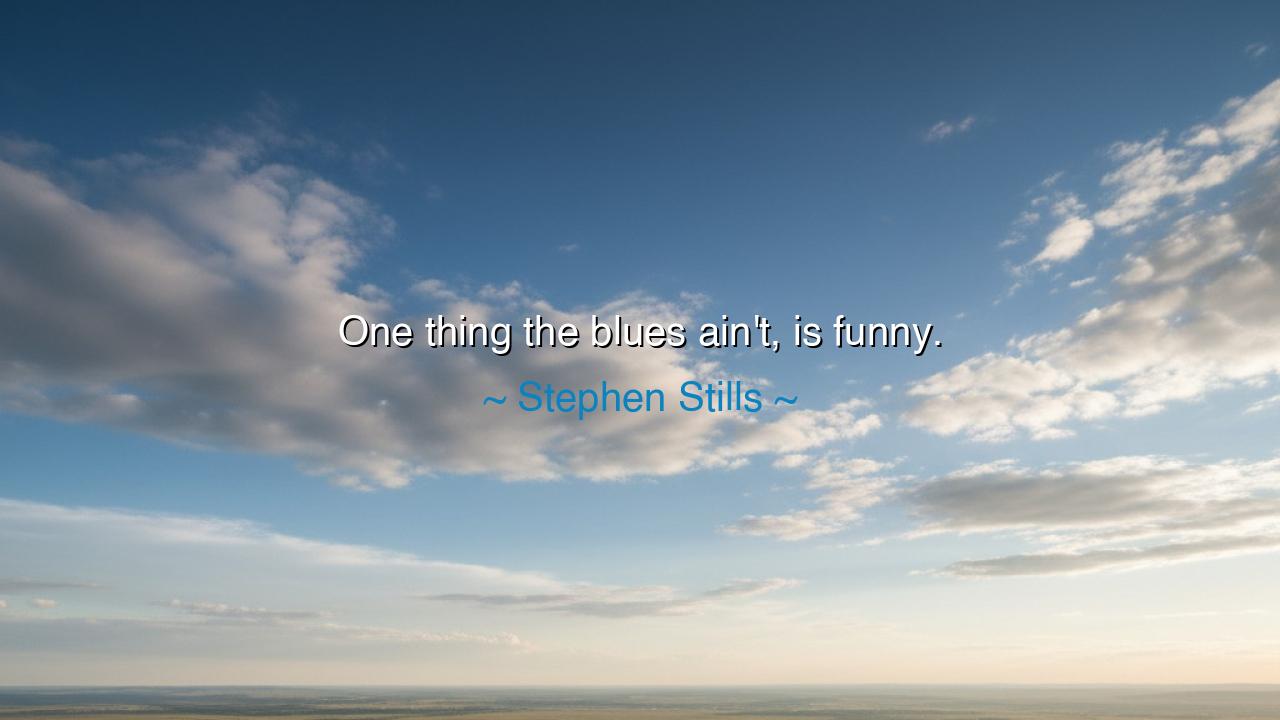
One thing the blues ain't, is funny.






“One thing the blues ain't, is funny.” Thus spoke Stephen Stills, the troubadour of restless hearts, whose voice carried both sorrow and fire. Beneath these few words lies the weight of a thousand weary souls — men and women who sang their pain into the night, not for laughter, but for truth. The blues, he reminds us, is not comedy. It is not jest. It is the sound of the soul confronting life’s heaviness and refusing to be silenced. The blues is truth set to rhythm, the cry of endurance that says, “I still feel, therefore I still live.”
In the ancient world, the poets and musicians were not mere entertainers; they were healers. They stood at the crossroads between grief and grace, translating pain into song. The blues was born of that same sacred lineage — from the fields of toil, from chains that clattered in the dark, from hearts that knew loss and yet still sought harmony. When Stills says it “ain’t funny,” he speaks not with disdain for laughter, but with reverence for honesty. For the blues does not hide behind jokes or masks. It dares to face sorrow directly, to speak of longing, injustice, and loneliness with eyes unflinching and voice unbroken.
Consider the old master B.B. King, whose guitar sang as though it had known heartbreak itself. Each note he played trembled with a kind of sacred weight — a confession without shame. When King sang “The Thrill is Gone,” the world listened not with amusement, but with recognition. He did not seek to entertain alone, but to reveal the human condition: that to live is to lose, and to love despite the losing. This is the essence of the blues — not despair, but dignity in sorrow, courage wrapped in melody. It is life stripped of pretense, and in that nakedness, it becomes beautiful.
The origin of the blues is written in the struggle of a people — born from the pain of the enslaved, the displaced, the forgotten. Out of suffering came rhythm, and from rhythm came meaning. The blues taught the world that sadness could be sung, that brokenness could make beauty. But this beauty was not born of laughter; it was born of endurance. That is why Stills’ words ring true — “One thing the blues ain't, is funny.” The blues does not mock the pain; it honors it. It refuses to turn the suffering of life into spectacle. It says, instead, “Feel it. Know it. Live through it.”
Yet within the sorrow of the blues, there is something paradoxical — a quiet joy. Not the laughter of jest, but the peace of survival. Those who have lived the blues know that to sing of your sorrow is to master it. To voice pain is to transform it from chaos into order. The ancients called this catharsis, the cleansing of the soul through art. The bluesman, like the poet of old, stands before the darkness and commands it to speak, and by doing so, he tames it. He teaches us that pain unspoken is despair, but pain expressed becomes strength.
From this truth, we may draw our lesson: honor your sorrow. Do not cover it with shallow laughter or run from its shadow. When grief comes, let it speak; when hardship comes, let it teach. There is a kind of nobility in sadness faced with courage. Just as the blues musician bends his strings until they cry, so too must you bend your heart until it sings. For it is not the absence of pain that makes one wise — it is the ability to endure it, to give it voice, and to rise above it.
Therefore, my friend, when you encounter suffering — your own or another’s — remember the wisdom of Stephen Stills: “One thing the blues ain’t, is funny.” Do not mock the weight of life, but bear it with grace. Turn your pain into purpose, your heartbreak into harmony. Sing your truth, however heavy it may be, and let your song remind others that sorrow can be noble and even beautiful when faced with honesty. For in the end, the blues is not the music of despair — it is the anthem of endurance, the heartbeat of every soul that has ever wept, yet still found the strength to sing.






AAdministratorAdministrator
Welcome, honored guests. Please leave a comment, we will respond soon